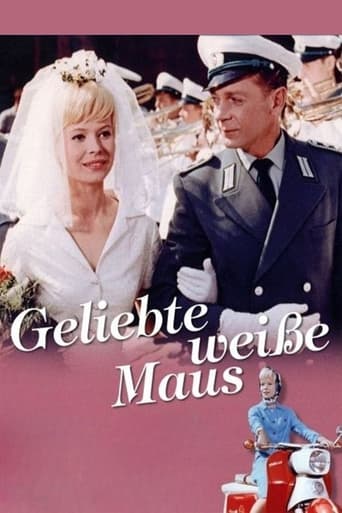PiraBit
if their story seems completely bonkers, almost like a feverish work of fiction, you ain't heard nothing yet.
Joanna Mccarty
Amazing worth wacthing. So good. Biased but well made with many good points.
Billie Morin
This movie feels like it was made purely to piss off people who want good shows
Quiet Muffin
This movie tries so hard to be funny, yet it falls flat every time. Just another example of recycled ideas repackaged with women in an attempt to appeal to a certain audience.
suchenwi
GDR (East Germany) has disappeared from the map since 1990, but the memory is still alive in the hearts of many people (even "Westerners" like me). One proof for that is that old East German movies on DVD are widely available as magazine gimmicks, monthly on Super-Illu.After my first taste with "Ich war neunzehn" a few months ago, I somehow developed a craving for DEFA movies (except I skipped the children's ones). For "Geliebte weisse Maus" I was first doubtful, but bought it to try my luck (not a difficult decision at EUR 2.99).I watched it once, and was very unsure what to make of it - musical numbers (not too bad though), fantastic scenes like out of Mary Poppins (which happens to have been made the same year, 1964)... I had to watch it again, and again, four times in a row after all.It sure is a shallow musical comedy. Boy meets girl, and after some tribulations they marry. Comedian Rolf Herricht, Karin Schröder (sometimes called "East Germany's Doris Day") lay the groundwork, add some benevolent People's Police officers, some more and some less proletarian figures. And yet...One thing that interests me in old or period movies is cars. Here you get a cross-section of East German car industry in 1964 and earlier. But also, the barber drives a VW beetle convertible, which must have added to the sinister impression he first makes. And for good justice, the car's hood is getting flattened by an elephant. A bi-color black/white Renault Dauphine is also briefly seen (earlier featured in "For Eyes Only", if I remember correctly). But most hilarious are the two Wartburg convertible police cars, where the main actors are collected in in the end. They have plausible VP (Volkspolizei) number plates, but I can't imagine them in reality.This movie isn't so very much about reality. Or is it? I've read it was a big box office success in 1964's East Germany. I can only wonder how viewers thought back then and there. I found it for example thrilling how the waiter reacts when asked for water - "Danziger Goldwasser? Schwarzwälder Kirschwasser? Whisky with mineral water? ..." Of course he was a comedian, but this choice of drinks has a very international appeal. Oh, I could go on and on...Watch this at your own risk. You might find it's blatant feel-good propaganda. (But so are no few Western films of the same time.) I at least, after watching it four times, really grew fond of it, and will watch it again :)
Hazel Freeman
Fritz Bachmann (Rolf Herricht) is a traffic control policeman at a busy intersection in Dresden, in the German Democratic Republic. He takes his work very seriously, and is in the running for a police competition for the best traffic officer.Every day a girl, Helene Braeuer, (Karin Schröder, fifteen years his junior) drives past on her motor scooter, going to her job at a cafe. A Romantic interest develops, and things develop nicely towards a happy ending.Interspersed with musical numbers, a fantasy sequence involving flying on an umbrella over Dresden (with the still-unrepaired war damage carefully out of shot) and some spoken verse, the plot never develops very much. This was East Germany's way of joining in the West's swinging sixties, but very much constrained by ideology to avoid any politically sensitive themes.

